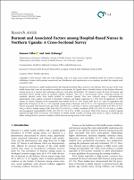Burnout and Associated Factors among Hospital-Based Nurses in Northern Uganda: A Cross-Sectional Survey
Abstract
Background. Burnout is a public health problem that disproportionately affects nurses in sub-Saharan Africa because of the weak
health systems that create an unconducive workplace environment. In Uganda, there is limited evidence on the burden of burnout
among nurses in a manner that undermine advocacy and policy formulation. We aimed to assess the level of burnout and
associated factors among nurses in northern Uganda. Methods. This was a cross-sectional survey conducted among 375
randomly selected nurses from health facilities in northern Uganda. Data were collected using a self-administered
questionnaire. Data analysis consisted of descriptive statistics and logistic regression at a 95% level of significance in SPSS
version 25. Results. Majority of the respondents were female 56.5% (n = 223). Nearly half, 49.1% (n = 194) of respondents had
high levels of burnout, 36.2% (n = 143) reported average levels of burnout, and 14.7% (n = 58) reported low levels of burnout.
Factors associated with burnout were age (AOR: 2.90; 95% CI: 1.28-6.58; p = 0:011), social support (AOR: 0.45; 95% CI: 0.22-
0.94; p = 0:033), healthy eating (AOR: 0.06; 95% CI: 0.02-0.22; p < 0:001), workload (AOR: 0.31; 95% CI: 0.14-0.68; p = 0:004),
and management responsibilities (AOR: 3.07; 95% CI: 1.54-6.12; p = 0:001). Conclusion. Half of the nurses in northern Uganda
experienced high levels of burnout. The Ministry of Health should consider recruiting more nurses to reduce workload and
adjust working hours to prevent workplace-related burnout among nurses in the country.
Collections
- Research Articles [13]

